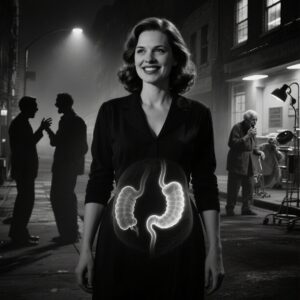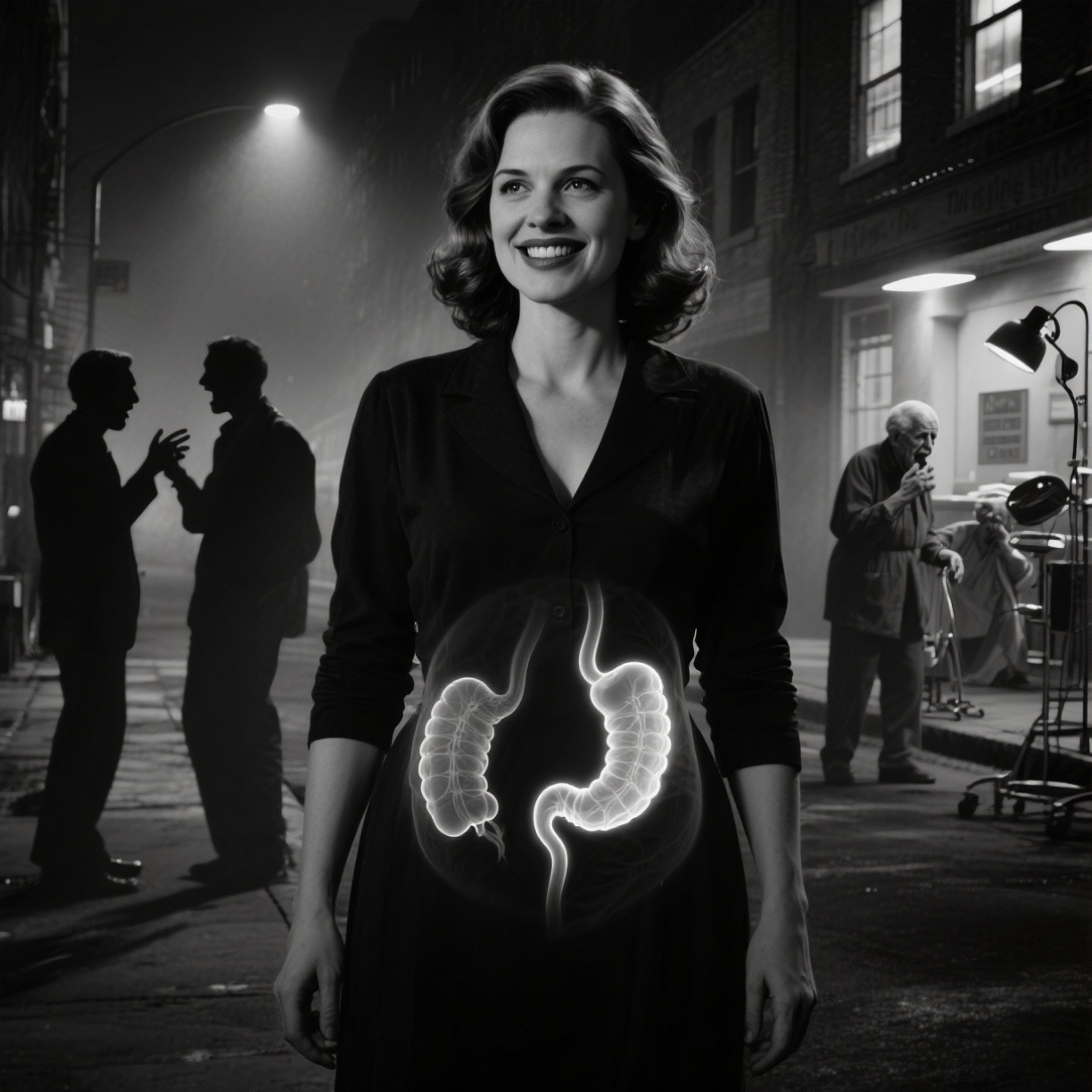Diana Has Two Stomachs !
# The Woman with Two Stomachs
*A Twilight Zone Story*
—
Dr. Helena Marsh had always been hungry.
Not the ordinary hunger that gnawed at most people between meals, but something deeper—a hollow ache that no amount of food could fill. She’d learned to live with it, the way others learned to live with chronic pain or poor eyesight. It was simply part of who she was.
The revelation came during what should have been routine surgery.
Helena lay unconscious on the operating table, her appendix inflamed and requiring immediate removal. Dr. James Kellerman, chief of surgery at Mercy General, made the first incision with practiced precision. What he found defied medical explanation.
“Nurse Williams,” he called, his voice tight with confusion. “Come look at this.”
Beneath Helena’s skin, nestled beside her normal stomach, was another organ—identical in every way except for its strange, luminescent quality. It pulsed with its own rhythm, completely separate from her heart.
“Doctor, what is that?” Nurse Williams whispered.
Kellerman had no answer. In thirty years of surgery, he’d never seen anything like it. The second stomach appeared fully functional, complete with its own network of blood vessels and neural pathways. But strangest of all, it seemed to be… empty. Completely, impossibly empty.
—
Helena awoke to find Dr. Kellerman sitting beside her bed, a thick file in his hands and concern etched deep in the lines around his eyes.
“Ms. Marsh, we need to talk,” he began carefully. “During your surgery, we discovered something unusual. You have a second stomach.”
Helena blinked, certain she’d misheard. “I’m sorry, what?”
“A second, fully developed stomach. We’ve run every test we can think of. It’s completely healthy, but…” He paused, struggling with words. “It appears to be empty. Not just of food, but of everything. No acid, no enzymes, nothing.”
The news should have terrified her. Instead, Helena felt something she’d never experienced before—a flicker of understanding. The constant hunger suddenly made sense.
“What does it do?” she asked.
“We don’t know. We’d like to run more tests, with your permission.”
Helena agreed, but deep down, she suspected she already knew what the tests would reveal. Nothing. Because the second stomach wasn’t meant to digest food.
—
The hunger grew worse after the surgery. Helena found herself eating constantly, yet the hollow ache only deepened. She lost weight despite consuming enormous meals. Her colleagues at the insurance office began to notice.
“You feeling alright, Helena?” asked Margaret from accounting, watching Helena devour her third sandwich of the morning. “You’ve been eating like you’re starving, but you look… thinner.”
Helena mumbled something about metabolism and returned to her desk, but Margaret’s words stayed with her. She did look thinner. Gaunt, even. And still, the hunger persisted.
That night, she stood in her kitchen at 2 AM, staring into an empty refrigerator. Everything was gone—the leftover pizza, the yogurt, even the condiments. She’d eaten it all, and still felt hollow.
Desperate, she drove to an all-night diner.
“What’ll it be, hon?” asked the waitress, a tired-looking woman named Dolores.
“Everything,” Helena said. “I’ll have everything on the menu.”
Dolores laughed. “You’re kidding, right?”
Helena’s eyes met hers, and the laughter died. There was something unsettling in Helena’s gaze—a desperate, consuming need that made Dolores take a step back.
“No,” Helena said quietly. “I’m not.”
—
As Helena ate, she became aware of the other patrons in the diner. A young couple arguing in hushed tones at a corner booth. A truck driver staring blankly at his coffee, his shoulders sagging with exhaustion. An elderly man counting coins, trying to determine if he had enough for pie.
And for the first time since her surgery, the second stomach stirred.
Helena felt it awakening, responding not to the food she was consuming, but to something else entirely. The couple’s argument grew more heated. The truck driver’s despair deepened. The old man’s humiliation intensified.
With each wave of human misery, Helena felt a strange satisfaction—not in her regular stomach, but in the other one. The empty one.
She tested her theory. Rising from her booth, she approached the arguing couple.
“Excuse me,” she said softly. “I couldn’t help but overhear. Relationship troubles?”
The woman looked up, tears in her eyes. “He’s been cheating. Six months. With my sister.”
Helena nodded sympathetically and sat down beside them. “Tell me more.”
As the woman poured out her heartbreak, Helena felt the second stomach responding, filling slowly with something that wasn’t food but was infinitely more nourishing. The constant hunger began, finally, to subside.
—
Over the following weeks, Helena discovered her true purpose. She became a magnet for human suffering. She volunteered at homeless shelters, worked the crisis hotline, visited hospitals. Everywhere she went, people opened up to her, sharing their deepest pains and fears.
And she fed.
The second stomach consumed their despair, their anguish, their hopelessness. Not taking it away—that would have been merciful. Instead, it fed on the raw emotion while leaving the source intact, like a parasite that keeps its host alive.
Helena grew beautiful. Her skin glowed with vitality, her eyes sparkled with unnatural brightness. She was more alive than she’d ever been, sustained by an endless buffet of human misery.
She told herself she was helping. After all, people felt better after talking to her. They thanked her for listening. She was providing a service.
But late at night, when the second stomach rumbled with hunger, Helena would seek out new sources of pain. She began to cultivate despair, to nurture it. A word here, a suggestion there, and she could turn mild disappointment into crushing defeat.

Dr. Kellerman called her in for a follow-up appointment six months after the surgery.
“Diana,” he said, studying her chart, “you look… remarkable. Whatever was wrong before seems to have resolved itself.”
“Yes,” she agreed. “I finally figured out what I was hungry for.”
“And what was that?”
Diana smiled, and for just a moment, Dr. Kellerman glimpsed something terrible in her expression—an appetite so vast and alien that it made him step back.
“Everything,” she said simply.
As she left the hospital, Diana passed the pediatric ward. Through the windows, she could see families gathered around sick children, their faces etched with worry and grief.
The second stomach growled.
Diana had always been hungry. Now she finally understood that her hunger could never be satisfied—only fed. And in a world full of suffering, she would never starve again.
Picture, if you will, a woman walking through a city at night. To those she passes, she appears to be just another face in the crowd. But look closer. See how shadows seem to gather where she’s been? Notice how the laughter dies a little, how the smiles fade just a touch?
Diana Marsh thought she was cursed with an unusual medical condition. What she discovered was far worse: she was blessed with an appetite for human suffering—and in a world that produces misery in abundance, she would feast forever.
Consider this the next time a stranger offers to listen to your troubles. Ask yourself: are they trying to help you heal… or are they simply very, very hungry?
From the case files of the Twilight Zone.


